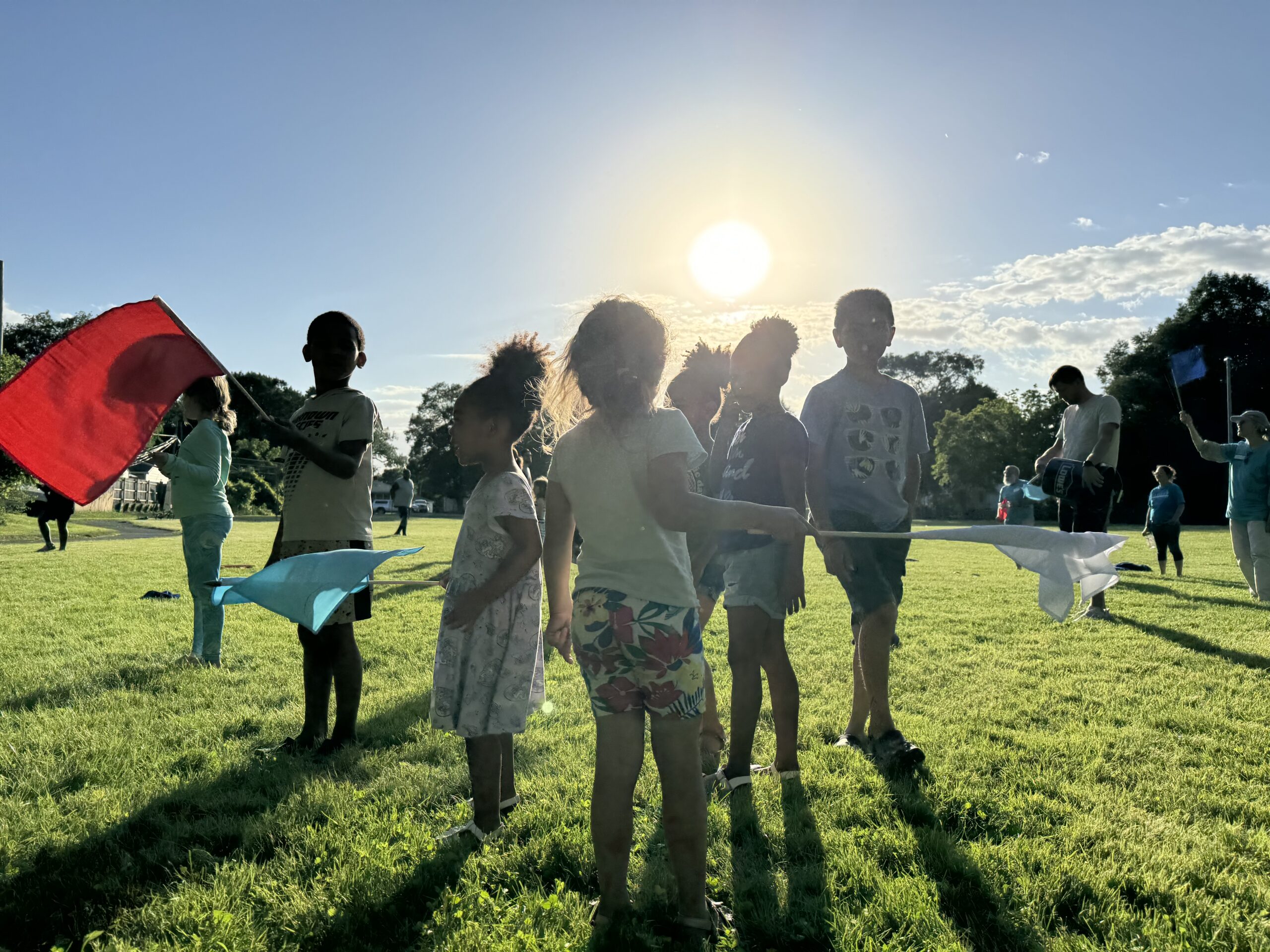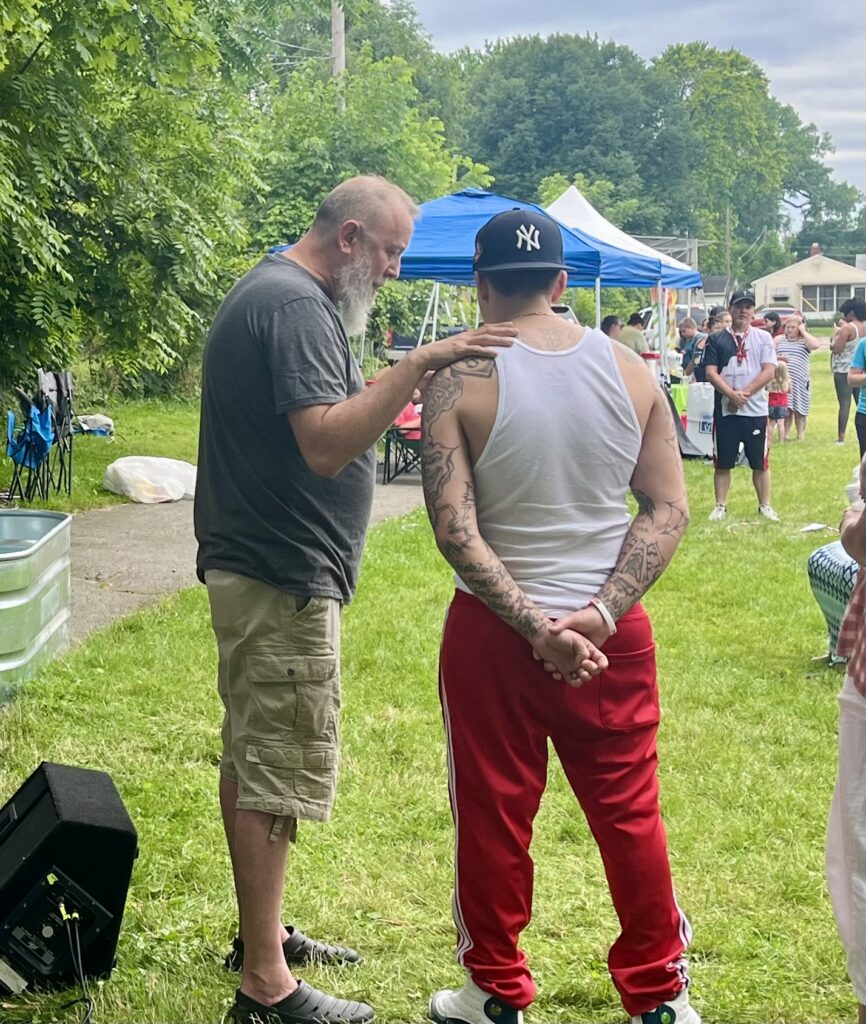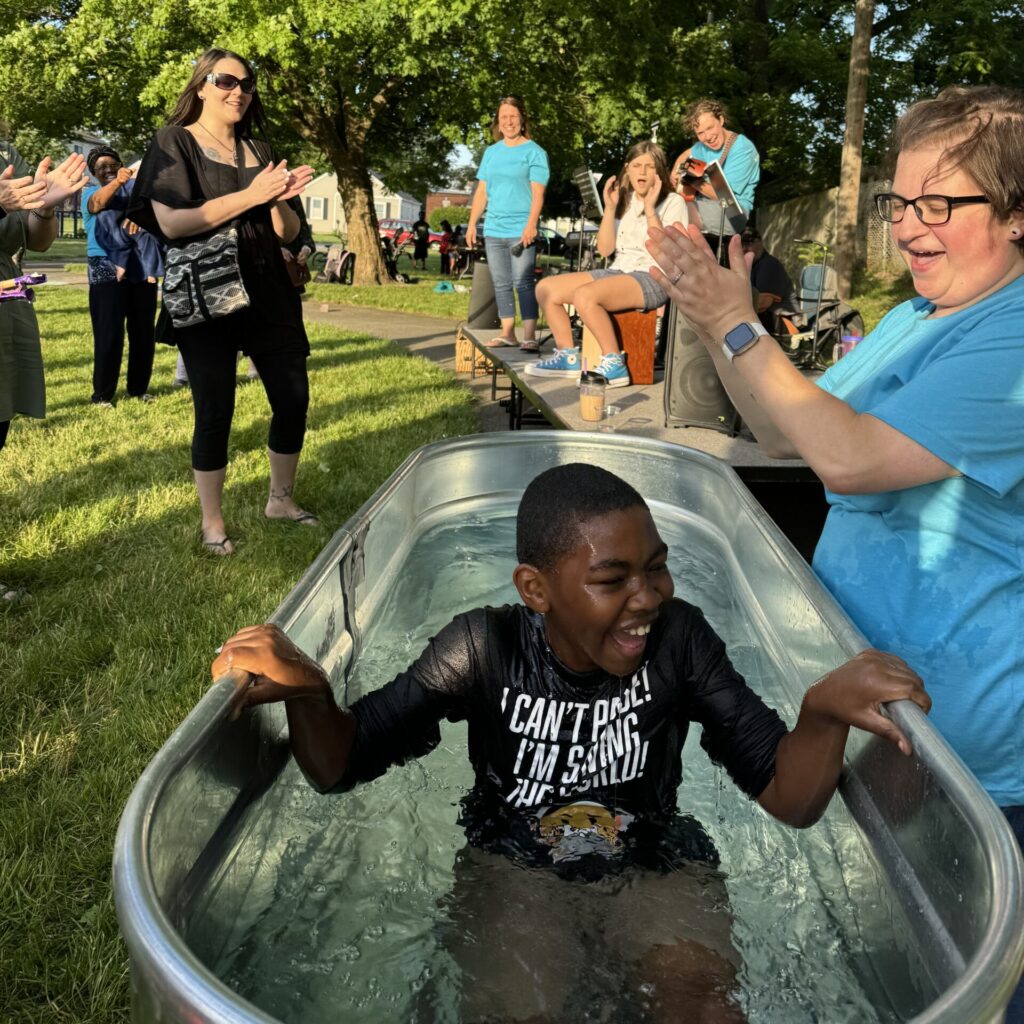5 Things
Five Lessons Learned While Reaching a Neighborhood
Published
8 months agoon

Years ago, I took the StrengthsFinder Assessment, which is designed to help a person understand their top gifts. “Achiever” fell at the top of my list, and I found myself feeling uncomfortable with this result. I wrestled with my uneasiness, unsure why I felt this way until God began to unlock my understanding. From the time I was young, I had built my life to be full to the brim, accumulating a long resume of accomplishments, none of which brought me satisfaction. Instead, God placed a hunger inside of me to be marked by the supernatural. One definition of supernatural is “above, beyond, and far higher and greater than the natural.” I longed to see things that exceeded what I could do through my own achievements and to witness the power of God in my daily life.
God placed a hunger inside of me to be marked by the supernatural.
Since that time, God has taught me to forsake striving and performance, instead discovering His will and wisdom by walking in friendship with Him. Even more than before, my heart yearns to experience ministry moments that inspire awe of our magnificent God. Our team had the honor of experiencing some of these moments during our summer of outreach at Asbury Park. As I share our story, I’ll also share the five lessons we learned through reaching our neighborhood.

1. We can partner with God to see His desires fulfilled.
We were gathered for our regular weekly prayer meeting when God said, “I want this neighborhood. Will you make My name great at Asbury Park?” We felt the weight of this invitation. For a year, we had been hosting neighbors in the basement of our ministry house for weekly dinners. Dozens had found community and a sense of belonging in that space. Some had already met Jesus, but He wanted us to cast the net further. No one on our team had imagined taking our Thursday night dinners out to the park for the summer. But God had heard our cry: “God, you get to do whatever is in your heart to do. We pray your will be done in this region and that Jesus would be glorified.” And that day, He gave us another piece of His blueprint for our region.
2. We don’t have to strive.
Naturally, we looked at the invitation from God and imagined possibilities of how to gather the community at our neighborhood park. We considered the successes of past events that utilized raffle and prize incentives or entertainment such as bounce houses. We went back to prayer and God revealed more of His plan to us. He wanted it simple. As we prayed, He gave us visions of the stations in the park: crafts themed to tell the story of creation, food to fill bellies, a field with kids carefree and playing, bold worship, and a baptismal. He said to get ready for people to be saved and baptized!
May we all live in daily expectation of the things that are beyond what we could do in our own ability, partnering with God and watching His fame spread across the earth.
3. God has a storehouse of provision.
Although God’s plan was relatively simple, we did not have the finances or workers to pull off this vision of taking dinners to the park every other week throughout the summer. God impressed upon us that He would be faithful to provide everything we needed to serve the community in this way. We chose to embrace His plan with faith that He would make a way.
4. God loves collaboration.
God brilliantly inspired us to reach out to many individuals and groups, inviting them to partner with us in reaching the Five Points Neighborhood in Toledo. Over a dozen churches were represented by the participants who filled volunteer slots and donated food and supplies. The greater Body of Christ truly came together, unified around Jesus and His mission.
5. Love + Power + Gospel = Jesus gets His reward
When our dinners first launched at the ministry base in 2023, God gave us a foundational verse to build upon:

“Walk continually in love [that is, value one another—practice empathy and compassion, unselfishly seeking the best for others], just as Christ also loved you and gave Himself up for us, an offering and sacrifice to God [slain for you, so that it became] a sweet fragrance” (Ephesians 5:2 AMP).
God desired for this aroma to rise to Heaven, the smell of a people walking in sacrificial love. And so, His people took that love to the park. We shared the good news that Jesus gave His life so that all could be saved, healed, and delivered. Many accepted the invitation to receive this gift from Jesus, giving their lives to Him. People experienced healing in their bodies and freedom from bondage. Many encountered the power of the Holy Spirit in a personal way. Twenty-four people chose to follow Jesus through water baptism!
God rained down this summer on Asbury Park. It was His plan, His provision, His glory. It was Jesus’ reward. May we all live in daily expectation of the things that are beyond what we could do in our own ability, partnering with God and watching His fame spread across the earth.
About the Author

Sarah Williams
Sarah Williams and her husband, George, have been in ministry together since they were married in 2006. They began their journey as urban missionaries, which led to planting and co-pastoring CityLight Church. In 2016, Sarah founded the Transformation Center, where she and her team have helped hundreds of people find wholeness and freedom. Sarah’s passion is for Jesus to receive His reward through salvation, healing, and deliverance. The team at the Transformation Center welcomes ministers to book a stay to receive personal ministry or to visit and partner with them in reaching their community.
5 Things
Five Trusty Tools for Parenting Teens
Published
2 months agoon
April 25, 2025By
Candi Hagan
Don’t you just hate it when you start a project and don’t have the right tools? I do. I love a good DIY project, but I almost always have to go buy a tool to get the job done. DIY projects feel very similar to parenting. You see a picture of something, think, “How hard could it be? Those people look happy with that baby – we’ve got this.” Then the teenage years hit, and it’s “Pinterest Fails” in real time: nothing looks like the picture, and you don’t have the right tools to do the job. Having the right tools can make all the difference, both in a DIY project and in parenting your teens.
Let’s be honest: parenting in 2025 is not for the faint of heart, and parenting teenagers during this time is something only crazy people do. Parenting with purpose and intentionality in the midst of smart phones, social media, unlimited access to information, and hormones kind of seems like a recipe for disaster. If you feel like your toolbox is missing some tools, let me share some that I use on a regular basis.
Five tools that are currently in my toolbox:
1. Healthy Boundaries.
If you don’t have them, now is the time to create them. You’re going to want to go ahead and set boundaries for the whole family: parents, kids, and every stinkin’ electronic device you own. You need a plan on how you are going to manage and honor these boundaries. Boundaries create margin, and margin is key to survival. Take some time and decide what you would like this to look like, plan it out, and stick to it.
2. A Healthy Relationship with Therapy.
I think a lot of times, we as Christians struggle with shame when our prayers don’t result in erasing all our mental and emotional pain (or that of our kids’). What if God’s answer to some of those prayers comes in the form of a great Christian therapist? Just like Esther, you and I were born for such a time as this, and in this time, we can access incredible resources found in a solid Christian therapist. It might not seem like a great idea and your kids might not like it at first, but have a conversation and strike up a deal. I was not above bartering with my teens, not when their mental health was on the line. This tool might not be for everyone, but give it some thought and maybe stick it in your toolbox for emergencies only.
3. Keeping the Conversation Going.
We all spend hours in the car, right? Take that drive time to ask your teen questions, simply listening without trying to fix anything (this is the hardest part). The goal is to create a space that allows your teen to feel heard, a space that lets them process their “BIG FEELINGS.” Be encouraged: this tool has a quick turnaround, similar to the timetable of teenage feelings. Hang in there, we will make it!
4. Good Coping Skills.
Drinking Starbucks and shopping at Target, though very enjoyable, are not healthy coping skills. We all have coping mechanisms and your teenagers will too, but we can help them develop healthy ways of dealing with their emotions. Take a walk, ride a bike, go fishing, journal, paint, listen to music, chop some wood (Anger is a real emotion and if you need firewood, it’s a BOGO!). The key is to help your child discover healthy ways of dealing with their “BIG FEELINGS”; they cannot be ignored, they must be processed, and one way or another they will be.
5. Proper Navigation of God’s Word.
I am hopeful that the seeds planted in the lives of my kids will bear much fruit and be a testimony of how good God is.
Does your child know how to read God’s word in a beneficial way? Have you spent time with your teen, teaching them the benefits of a quality quiet time? Don’t just ask your teen, “Do you know who you are in Jesus?” They might not understand how to answer that; my kids didn’t the first time I asked them. Get them a good study Bible, grab that cool journal, and yes, buy the fun pens. We want to encourage this time in the Word. This must be a priority in their life so that when they encounter all of those “BIG FEELINGS,” they can lay those down next to the Word of God, discover who God is, and in turn understand who they are in Him.
Take heart, we will make it through this. It’s just a season, right? I don’t know all the answers, but I am hopeful that the seeds planted in the lives of my kids will bear much fruit and be a testimony of how good God is and how much He really loves us! Now, go fill your toolbox with some good tools!
About the Author

Candi Hagan
Candi Hagan is a pastor and art teacher living in sunny Florida with her husband, Nathan, and their three teenagers (though they’re on the brink of their empty-nester adventure). Together, she and Nathan serve as the Regional Directors for the Southeast Region of Open Bible Churches. Candi is always working to be the best version of herself and is so thankful for the restoration found in Jesus. When she’s not teaching or ministering, you’ll likely find her in the kitchen whipping up something delicious, in the garden tending to her plants, or painting.
5 Things
Five Actions to Address the Gap of Women in Ministry Leadership
Published
6 months agoon
December 20, 2024By
Julie Cole
Open Bible has a rich heritage of women ministry leaders. Our denomination was birthed in revival and formed by the union of two movements that branched off from other denominations founded and led by women (Florence Crawford and Aimee Semple McPherson). Open Bible’s position on women in ministry leadership celebrates women leaders at all levels. However, even with this rich history and current blessing for women in ministry leadership, it is still rare to find women in certain ministry positions within our churches. There are multiple reasons for this, but here are five actions to consider when addressing this issue.
1. Look at your own biases.
Most often, women aren’t chosen for senior leadership roles because “it hasn’t been done before.” Tradition can be a powerful force, but sometimes it keeps important change from happening. Ask yourself how you would feel if a woman were chosen as the senior pastor of your church. Chances are it might feel awkward. Awkward doesn’t always mean it’s wrong. It usually means it’s just different. This awkwardness is often temporary, and the willingness to lean into it can create new opportunities for women to lead. When a ministry leadership position opens, allow yourself to consider both women and men as candidates for the position.
2. Study what Scripture says about women leaders.
The Old and New Testaments are full of women who played important leadership roles at all levels. Look at the influence and level of authority they were given. Study the “problem passages” (e.g. 1 Corinthians 14:34 and 1 Timothy 2:12) in Scripture that appear to limit women teaching and speaking. Some reputable scholars and commentaries show how these passages were meant to address specific problems that the early church dealt with rather than become an overall rule limiting women in leadership. If you are a church leader, clearly communicate your church’s position on women in ministry leadership. Too often, this topic is ignored, keeping the status quo going.
3. Champion women leaders.
Encourage women, young and old, who have the gift to lead. Mentor them. Hire them. It is a blessing when a woman unselfishly cheers on another woman in her leadership; too often, there’s a temptation to be jealous or deliver harsh criticism, which leads to hesitance in stepping into leadership. It’s especially impactful when a male leader encourages and makes room for a woman to lead. Giving the same opportunities to women that would be given to men who are learning to lead is so important. Too often it is rare to have a young woman given time on stage or other public responsibilities while such opportunities are given to the men who are being trained. Try to be equal where you can. Make room for inexperience and give repeated opportunities to learn and grow.
4. Preach about strong women leaders in the Bible.
Scripture is filled with women leaders such as Miriam, Hannah, Esther, Deborah, Mary, and Priscilla. Highlighting their lives shows how God’s leadership gifts are given to both men and women. This encourages women leaders and gives them biblical role models.
5. Nurture a culture of leadership sharing.
Many times, the church hears from one pastor’s voice most of the time. Regularly sharing the pulpit creates space where leaders in training can experience public ministry. Allowing both men and women to preach helps your congregation become accustomed to both male and female leadership, creating a bench of players who can be trained to assist at all levels of church leadership. This keeps the church from idolizing or draining one leader and allows more people’s gifts to be shared.
The Church, the Bride of Christ, functions more fully when men and women work side by side in leadership. When women’s voices and leadership gifts are ignored or limited, half of the Church’s voice is muted. However, when men and women unselfishly share leadership and influence, God’s kingdom moves forward powerfully. This unselfish sharing of leadership reflects God’s nature more fully, creating a space where the Holy Spirit can come and powerfully move.
Additional resources:
- Open Bible Manual – Official Statements 7.6: The Role of Women in Ministry and Leadership (p. 89)
- Open Bible Webinar: Women in Ministry Leadership: Answering God’s Call
- Book to help with biblical theology of women in ministry leadership: God’s Women Then and Now by Deborah M. Gill and Barbara Cavaness.
About the Author

Julie Cole
Julie Cole is the Associate Director of Spiritual Formation and Soul Care at The King’s University in Southlake, TX. She’s a licensed marriage and family therapist, spiritual director, and an ordained minister. Julie desires to inspire people to hear God’s voice and to see His hand in both the big and small experiences of life. Julie and her husband, David, live in Fort Worth, Texas, and have four children and eight grandchildren with two more on the way in 2025.
5 Things
Five Keys for Creative Fundraising in Student Ministries
Published
12 months agoon
July 1, 2024
Every student should have an opportunity to encounter Jesus beyond the walls of a church. Most students further their relationship with Christ at special events like church camps or mission trips. But the reality of these intentional events is that they cost money, and sometimes a lot of money, for our students. Money should never be the reason a student doesn’t get to experience Jesus in a new way. Fundraising can be daunting for a youth pastor, but it doesn’t have to be! We have found that there are some consistent keys to make fundraising enjoyable, successful, and a blessing to the community.
- Diversify your fundraising sources.
Sometimes it is difficult to fundraise because it feels like we are asking the same people repeatedly to donate. When planning which types of fundraisers you’re going to do each year, make sure the fundraisers draw from various sources and audiences.
- Have a fundraiser that focuses on church engagement, allowing church members to bless the youth (e.g. Dessert Auction, Work Project, Bingo Night).
- Have a fundraiser that draws from the local community. These might offer a service that people in your community need or enjoy (e.g. Car Wash, Flower Basket Sales, Corn Hole Tournament, Restaurant Coupons).
- Have a fundraiser that draws from parents. They are going to have to pay for a portion of the event cost, so you might as well offer something to them in exchange for their investment
.(e.g. Dunk Tank to dunk students or youth leaders, Date Night with babysitting at the church).
- Lastly, have a fundraiser that casts a wide net and engages high numbers of people. You never know who will want to support you or who will want to help you network (e.g. Call/Text-A-Thon).
- Make fundraisers fun for students!
The worst thing ever is when leaders or parents are doing all the work to fundraise for their students. When we make fundraisers fun, students will want to show up and do the work. Here are two of our favorites as examples:

- Wing-A-thon: We have a local chicken shack that makes incredible wings, and they allow us to come in and eat unlimited wings for an hour. Students must collect sponsors to pay them for each wing they can eat. There are “Wing Refs” that ensure students eat all the meat off the bone, there is trivia for spectators, and prizes are awarded based on most wings eaten, fewest wings eaten, spiciest basket finished, surprise competitor, etc. We even let family members eat on behalf of students to encourage everyone to participate (sponsors just need to know it is Dad eating the wings and not a 12-year-old).
- Dunk Tank Fundraiser: Every year at our summer baptism service, we spend a couple hundred bucks and rent a dunk tank. People can pay ten dollars for three chances to dunk the student of their choice, and at the end we do a bidding war for people to be able to dunk each of our staff pastors. You’d be surprised how high some of these bids can get!
- Utilize business sponsorships.
Business sponsorships are typically in larger amounts than contributions from individual donors, and they can serve multiple purposes. These funds can be used to make fundraiser events better by allowing you to purchase prizes, decor, or props. They can cover costs (like paying for everyone to eat unlimited wings so it doesn’t count against the student fundraising). They can go towards travel expenses to help drive down event costs. Any leftover funds can be offered to students who have a harder time fundraising. One perk of a church being a non–profit is we can provide businesses with tax donation forms for anything they give. Additionally, engaging these businesses fosters community partnership.
Money should never be the reason a student doesn’t get to experience Jesus in a new way. Fundraising can be daunting for a youth pastor, but it doesn’t have to be!
- Allow fundraisers to be outreach opportunities.
Fundraisers are wonderful opportunities to invite people into church environments. Encourage students to invite their friends and family to come support at fundraising events. Encourage leadership to attend fundraisers to socialize and build new relationships. Find ways to pray at the event, share testimonies, and model the gospel.
- Overpromote!
Utilize every platform you have in promoting your fundraisers. Make them a Facebook event, post them on your organization’s website, post social media stories that students and parents can share, create graphics for church announcements and printed fliers, send emails via your church database, and have fundraising nights where you sit down with your students to help them write and send out support letters. Lastly, never assume a student will fill their guardians in on what is going on. Always individually connect with parents and give them the information directly.
Fundraising does take work and intentionality, but it is so worth it. Instead of focusing on the money, keep the focus on Christ. He will provide in a perfect and timely manner. Philippians 4:19 says, “And my God will supply every need of yours according to his riches in glory in Christ Jesus” (NIV). Plan with intention, but have fun with your students, church, and community as you equip these students for an awesome opportunity to experience Jesus!
About the Author

Aaron and Christine McAndrews
Aaron and Christine McAndrews both grew up in Thurston, Oregon, and love the people there like family. They serve at Waypoint Community Church as youth pastors and volunteer with Young Life. Aaron attended Fuller Theological Seminary for his Master of Divinity, and Christine attended the University of Oregon for her Bachelor of Arts in education. Aaron serves as a US Army Chaplain for the Oregon National Guard, and Christine is an educator in a local elementary school. Both have a heart to serve the youth in their community.








